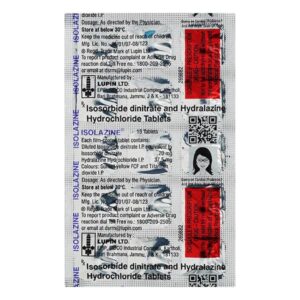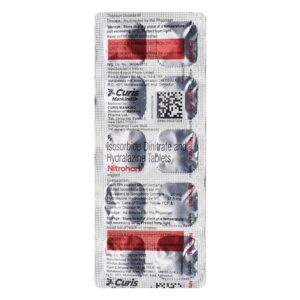ISOSORBIDE DINITRATE + HYDRALAZINE
Isosorbide Dinitrate: Isosorbide dinitrate is a medication used to prevent and treat chest pain (angina) caused by coronary artery disease. It belongs to a class of drugs called nitrates, which work by relaxing and widening the blood vessels, allowing for improved blood flow and reducing the workload on the heart.
The primary use of isosorbide dinitrate is to relieve angina attacks and to prevent them from occurring. It is commonly prescribed for individuals with stable angina who experience chest pain during physical activities or emotional stress. It may also be used as a long-term preventive treatment to reduce the frequency and severity of angina attacks.
The mechanism of action of isosorbide dinitrate involves the release of nitric oxide, which activates an enzyme called guanylate cyclase. This enzyme then increases the production of cyclic guanosine monophosphate (cGMP), which helps to relax the smooth muscle in the blood vessels, resulting in vasodilation and improved blood flow.
The dose of isosorbide dinitrate can vary depending on the individual’s condition, response to treatment, and other factors. It is typically taken orally as tablets or capsules, and the recommended starting dose ranges from 5 to 20 mg, taken 2 to 3 times daily. The dose may be gradually increased or adjusted as needed to achieve the desired effect.
As with any medication, isosorbide dinitrate may cause side effects. Common side effects can include headaches, dizziness, lightheadedness, flushing of the face, and low blood pressure. These side effects are usually temporary and may resolve with continued use or a lower dose. However, if these symptoms persist or worsen, it is important to consult a healthcare professional.
Less common side effects can include nausea, vomiting, blurred vision, dry mouth, and changes in heart rate. Serious side effects are rare, but can include severe allergic reactions, fainting, chest pain, and difficulty breathing. If any of these serious side effects occur, immediate medical attention should be sought.
Isosorbide dinitrate should not be used in combination with certain medications, such as erectile dysfunction drugs (e.g., sildenafil, tadalafil) or riociguat, as it can cause a severe drop in blood pressure.
Overall, isosorbide dinitrate is an effective medication for managing and preventing angina attacks. However, it is important to follow the prescribed dosage and consult a healthcare professional regarding any concerns or potential drug interactions.
Hydralazine: Hydralazine is an antihypertensive medication used to treat high blood pressure. It is commonly used when other medications have not effectively controlled blood pressure or when a patient cannot tolerate other antihypertensive drugs.
The exact mechanism of action of hydralazine is not fully understood. However, it is believed to dilate the arteries by directly relaxing the smooth muscle cells of the blood vessel walls. This dilation reduces peripheral resistance, which subsequently lowers blood pressure. Hydralazine may also have a direct impact on the heart, leading to increased cardiac output.
The typical starting dose of hydralazine is 10 to 25 mg taken orally four times a day. The dosage may be adjusted based on the response and tolerance of the individual. Doctors may prescribe higher doses for severe hypertension or lower doses for elderly or frail patients. It is crucial to follow the prescribed dosage and schedule provided by the healthcare professional.
Like any medication, hydralazine can cause side effects. Common side effects include headache, flushing, dizziness, palpitations, and tachycardia (rapid heart rate). These side effects are usually mild and go away on their own. However, if they persist or become bothersome, it is important to consult a healthcare provider.
Serious side effects may occur in rare cases and require immediate medical attention. These include chest pain, shortness of breath, swelling in the feet or ankles, fever, joint pain, rash, and jaundice. It is crucial to report any unusual or severe side effects to a healthcare provider promptly.
Hydralazine is generally considered a safe and effective medication when used as prescribed. However, it should be used under the guidance of a healthcare professional, and regular blood pressure monitoring is recommended to ensure proper control.


